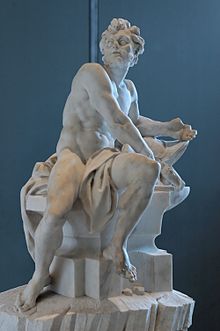Hephaestus
| Hephaestus | |
|---|---|
| God o fire, metalwirkin, stane masonry, forges an the airt o sculpture, blacksmiths | |
 Hephaestus at the Forge by Guillaume Coustou the Younger (Louvre) | |
| Abode | Moont Olympus |
| Symbol | Haimer, stiddie, tongs, an/or quail |
| Personal Information | |
| Consort | Aphrodite, Aglaea |
| Childer | Thalia, Eucleia, Eupheme, Philophrosyne, Cabeiri an Euthenia |
| Parents | Hera an Zeus, or Hera alane |
| Siblins | Ares, Eileithyia, Enyo, Athena, Apollo, Artemis, Aphrodite, Dionysus, Hebe, Hermes, Heracles, Helen of Troy, Iasion, Perseus, Minos, Tantalas, the Muses, the Graces |
| Roman equivalent | Vulcan |
Hephaestus (/hɪˈfiːstəs/, /həˈfɛstəs/ or /hᵻˈfɛstəs/; aicht spellings; Auncient Greek: Ἥφαιστος Hēphaistos) is the Greek god o blacksmiths, craftsmen, airtisans, sculptors, metals, metallurgy, fire an volcanoes.[1] Hephaestus' Roman equivalent is Vulcan. In Greek meethologie, Hephaestus wis the son o Zeus an Hera, the king an queen o the gods. In anither version, he wis Hera's parthenogenous bairn, rejectit bi his mither acause o his deformity an thrawn oot o heiven an doun tae yird.[2]
As a smithin god, Hephaestus made aw the wappens o the gods in Olympus. He servit as the blacksmith o the gods, an wis worshippit in the manufacturing an industrial centres o Greece, pairticularly Athens. The cult o Hephaestus wis based in Lemnos.[1] Hephaestus' seembols are a smith's hammer, anvil, an a pair o tongs.
References
[eedit | eedit soorce]- ↑ a b Walter Burkert, Greek Religion 1985: III.2.ii; see coverage o Lemnos-based tradeetions an legends at Mythic Lemnos)
- ↑ Graves, Robert (1955). The Greek Myths:1. Harmondsworth, Middlesex, England: Penguin Books. p. 51.
